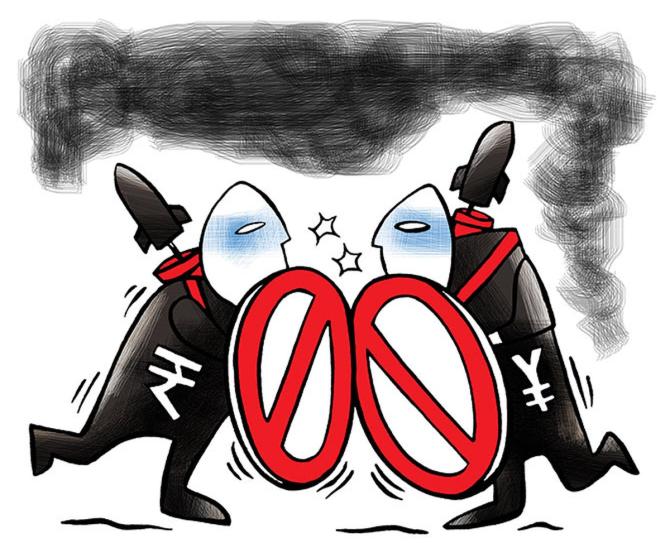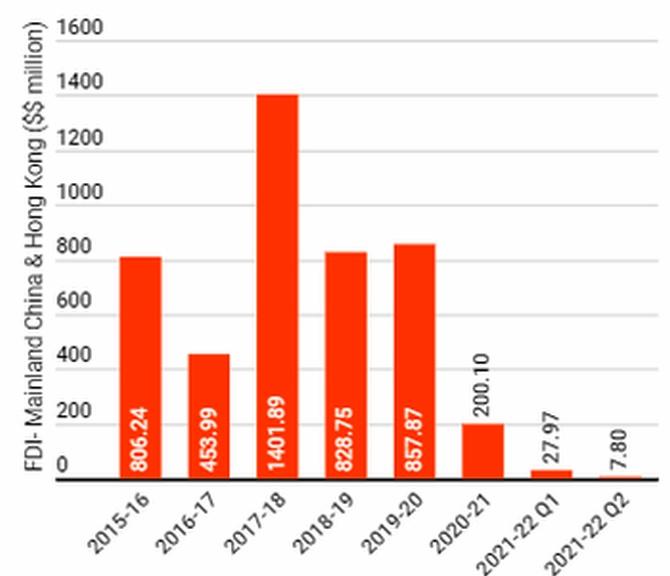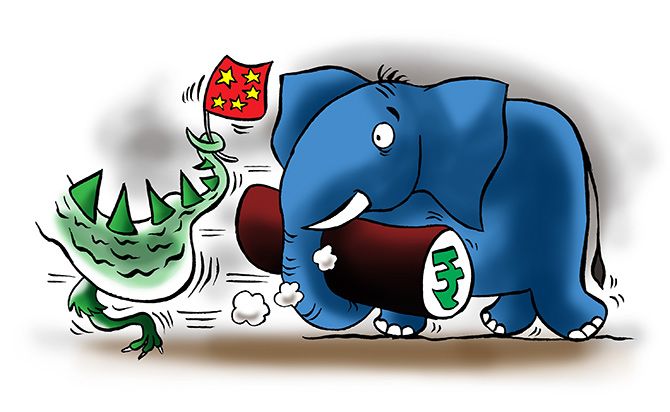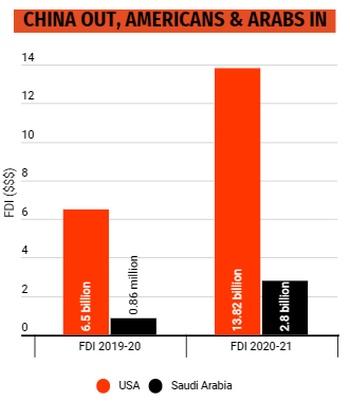 | « Back to article | Print this article |
In 2020-2021, the amount of foreign direct investment into India from China and Hong Kong plummeted to just $200 million -- its lowest in the recent past.
In the first half of 2021-2022, FDI investments through these two nations stood at just $36 million.

With the 14th round of military talks failing to yield any positive outcome on the Ladakh border dispute between India and China, the country's army chief recently highlighted that the Chinese threat continues to loom over India.
At the same time, the Modi government has reportedly considered easing investment restrictions that were aimed at the Chinese in the wake of deadly clashes between Indian and Chinese troops in early 2020.
In April 2020, the government shut down foreign investments from nations sharing a land border with India under the automatic route.
Aimed primarily at China, foreign investors from these nations would have to seek government approval before pumping money or increasing their stakes in Indian companies.
According to the government's communication at the time, these restrictions were aimed at preventing 'opportunistic takeovers' of Indian companies by the Chinese in the backdrop of the Ladakh conflict.
A look at the sequence of events from the time the restrictions were introduced shows that the Indian move literally turned the taps off for Chinese investors, who were looking to earn big in one of the world's most lucrative technology start-up ecosystems that has created 81 unicorns over the last few years with over half of them attaining billion-dollar status just last year.
The Indian move not just stopped money flows from mainland China but also from Hong Kong, the preferred proxy investment destination (in addition to Singapore) from where big Chinese investors channel money into Indian companies (please see graphic).

Official figures show that from 2015-2016 to 2019-2020, foreign direct investments from China and Hong Kong to India stood at almost $6 billion.
They invested $1.5 billion in India on an average every year during this period.
Chinese investors have historically formed a small proportion of FDI flows into India but have been one of the biggest strategic investors in the new-age technology sector over the last few years.
In the wake of the Ladakh clashes, the Modi government decided to turn the heat on Chinese investors by amending rules on April 17, 2020.
This effectively closed doors for Chinese investors looking for lucrative deals across the border.
In 2020-2021, the amount of foreign direct investment into India from China and Hong Kong plummeted to just $200 million -- its lowest in the recent past.
In the first half of 2021-2022, FDI investments through these two nations stood at just $36 million.
Much of the Chinese money in the past had flowed through the automatic route under which foreign investors need not take permission from either the Reserve Bank of India or the government for their investments in the country.
So intense was the scrutiny from Indian authorities that most of the few millions that came to India from China and Hong Kong were either from Indian bankers posted in branches in these nations or from non-Chinese-controlled entities.
For instance, in the last quarter of 2020-2021, just about $18 million flowed from Hong Kong into India.
Two-thirds of this money was pumped in by a part British-owned, Mauritius-based venture capitalist firm through Hong Kong and was meant for a Pune-based cellular phone tower company.

In November 2020, Anurag Jain, secretary of the Department of Promotion of Industry and Internal Trade (DPIIT), had indicated that the government was looking at easing these restrictions and that FDI proposals that 'deserved proper consideration', but fell under the ambit of post-Ladakh conflict circumscriptions would be facilitated.
Jain had also indicated that the government's move targeting Chinese money had yielded the desired results.
'It was a national emergency and so we had to come out with those rules. Those (restrictions) have done good for the industry at large.' Jain said.
The Indian blow to trans-Himalayan investments also came at a time when some of the biggest Chinese investors were facing the heat from authorities back home and were desperate to invest their billions elsewhere amidst a crackdown on their operations.
"Many prominent Indian technology companies and start-ups also became weary of Chinese money after the April 2020 government order, "said Amit Nawka, partner at PricewaterhouseCoopers.
"This was a big setback for the Chinese since they were among the first ones globally to realise the huge potential of new-age companies in India," Nakwa added.
"That's because they themselves had lived through that start-up experience a decade ago in China where the demographics, investment potential and valuations were similar to that being seen in India today," Nawka explained.
The Chinese Communist party has been cracking down on monopolistic practices in the country by levying fines on companies like Alibaba and Tencent.
Both are marquee investors in some of the biggest technology start-ups in India.
In 2020, Jack Ma-backed Ali Baba was fined $2.8 billion for anti-competitive practices. It will be fined millions of dollars more this year on similar allegations.
Alibaba's Singapore-based subsidiary Ant Financial is a huge investor in Indian unicorns like Paytm, Zomato, BigBasket, Snapdeal and others.

In 2021, Tencent was found guilty on multiple counts of stifling competition.
It was fined millions of dollars and could face further punitive monetary actions this year.
Authorities in Beijing have prohibited Tencent from updating its various applications and imposed advertisement restrictions that have hit the company hard.
Tencent has multiple investments in Indian companies like Flipkart, Swiggy, Practo, Gaana and others.
One of the most remarkable aspects of the Modi government's strategy to block Chinese money has been the incurring of minimal collateral damage.
The US displaced Mauritius, traditionally the largest offshore source of Indian FDI, as the second biggest investor in the country.
Similarly, the rise in investments from Saudi Arabia and the United Arab Emirates more than compensated for the decline in Chinese investments through offshore destinations like Hong Kong and Mauritius.
And the investment party without the Chinese may not be over just yet.
"India got $10 billion in venture capital funds in new-age companies in just the first half of 2021-2022. American and European funds have scaled up investments big time. If that run continues, then this year might be even better than the previous one," Nawka added.
"Indian companies have also got non-Chinese investors on board and in many cases not allowed the Chinese to double up on their existing investments. With big Indian corporations also showing more interest, their relevance should further decline," Nawka predicted.
In this double-whammy of a concurrent crackdown on big Chinese money, the two sparring nations seemed to have coincidentally and rather unwittingly found a common enemy.
Feature Presentation: Rajesh Alva/Rediff.com